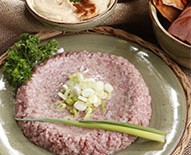The Changing Family Role of the Arab American Father
By Daniel Gil/ Contributing Writer
In 1993, Halim Barakat released a book titled The Arab World where he outlined typical trends and normalities in Arab society, culture, and family life. According to Barakat, the father plays the role of the patriarch, a veritable ruler over his family kingdom.
“The wife joins his kin group (patrilocal kinship) and the children take his surname (patrilineal descent). The father expects respect and unquestioning compliance with his instructions…” Barakat wrote in his book. He argues the traditional role of the father stems from the division of labor along gendered lines which have assigned males as the “breadwinners” of the family.
“My father assumed a traditional role especially because we in the Arab world growing up,” says Amal David the Director for Community Outreach at ArabAmerica. “He earned living to support my mom and the 9 children in the family.” Amal says she remembers her father’s face dripping with sweat while he carried groceries to their home in Nazareth during his lunch break as Amal’s mother was busy raising nine children.
Amal says her father was “very strict,” and “didn’t express his love the way most American dads do…. But we could detect it by our good schooling, our nutritious diets, and his attention to our visits to the doctor.”
However, as gender has become less associated with traditional labor roles in the 21st century, the traditional notion of the Arab nuclear family similar to Amal’s has certainly diminished as well. This is especially true of families living in the United States as cultural blending blurs the lines of Arab social practices with American ones.
“My father was far from a typical one,” says Mike Enayah, a member of the Arab America ambassador network whose family is also Palestinian. “ He was a visionary, and bucked the cultural trends and traditions…. But at the core my father was an authoritarian masked with a lot of generosity and communications. And many decisions were based on mood.”
Enayah believes the traditional patriarchal family perpetuated in many Arab countries around the world has “changed drastically from what it used to be,” and, according to Barakat’s book on Arab life, this may have to do with societal changes all together.
Amal echoes this sentiment saying, “the role of the father is changing significantly whether in the Arab World or in the U.S. Fathers now give their children the freedom to make their own decisions.” The crux of the argument is then found between the classic debate of tradition and social change in an age of an Arab culture becoming more malleable. On one hand, traditionalists argue the decline of family morals is at stake, on the other are notions of more progressive roles men, women, and children are capable of assuming.
In his conclusion, Barakat wrote “Arab society, then, is the family generalized or enlarged, and the family is society in miniature. Both act on and react to one another. The interconnection renders social institutions inseparable even for the purpose of abstract analysis. Within such a network of relationships, social phenomena develop and change in a manner dictated by their locations and affiliations with respect to the whole.”
Considering this, it is no real surprise family roles are changing considering the mixing of cultures most western countries have come to embrace over the past half century, despite the current political atmosphere.
Enayah doesn’t believe an Arab family can be “successful if it is stuck with the traditional gender roles. It might be a cliché, but it is ‘best to take the best of what both cultures have to offer’ and always examine and assess the legacy.”


